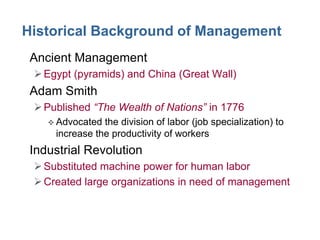
Management history
- 1. Historical Background of Management • Ancient Management Egypt (pyramids) and China (Great Wall) • Adam Smith Published “The Wealth of Nations” in 1776 Advocated the division of labor (job specialization) to increase the productivity of workers • Industrial Revolution Substituted machine power for human labor Created large organizations in need of management
- 2. Development of Major Management Theories
- 3. Major Approaches to Management • Scientific Management • General Administrative Theory • Quantitative Management • Organizational Behavior • Systems Approach • Contingency Approach
- 4. Scientific Management • Fredrick Winslow Taylor The “father” of scientific management Published Principles of Scientific Management (1911) The theory of scientific management – Using scientific methods to define the “one best way” for a job to be done: • Putting the right person on the job with the correct tools and equipment. • Having a standardized method of doing the job. • Providing an economic incentive to the worker.
- 5. Taylor’s Five Principles of Management 1. Develop a science for each element of an individual’s work, which will replace the old rule-of-thumb method. 2. Scientifically select and then train, teach, and develop the worker. 3. Heartily cooperate with the workers so as to ensure that all work is done in accordance with the principles of the science that has been developed. 4. Divide work and responsibility almost equally between management and workers. 5. Management takes over all work for which it is better fitted than the workers.
- 6. Scientific Management (cont’d) • Frank and Lillian Gilbreth Focused on increasing worker productivity through the reduction of wasted motion Developed the microchronometer to time worker motions and optimize performance • How Do Today’s Managers Use Scientific Management? Use time and motion studies to increase productivity Hire the best qualified employees Design incentive systems based on output
- 7. General Administrative Theorists • Henri Fayol Believed that the practice of management was distinct from other organizational functions Developed fourteen principles of management that applied to all organizational situations • Max Weber Developed a theory of authority based on an ideal type of organization (bureaucracy) Emphasized rationality, predictability, impersonality, technical competence, and authoritarianism
- 8. Fayol’s 14 Principles of Management 1. Division of work. 7. Remuneration. 2. Authority. 8. Centralization. 3. Discipline. 9. Scalar chain. 4. Unity of command. 10. Order. 5. Unity of direction. 11. Equity. 6. Subordination of individual interest to the interests of the organization. 12. Stability of tenure of personnel. 13. Initiative. 14. Esprit de corps.
- 10. Quantitative Approach to Management • Quantitative Approach Also called operations research or management science Evolved from mathematical and statistical methods developed to solve WWII military logistics and quality control problems Focuses on improving managerial decision making by applying: Statistics, optimization models, information models, and computer simulations
- 11. Understanding Organizational Behavior • Organizational Behavior (OB) The study of the actions of people at work; people are the most important asset of an organization • Early OB Advocates Robert Owen Hugo Munsterberg Mary Parker Follett Chester Barnard
- 12. The Hawthorne Studies • A series of productivity experiments conducted at Western Electric from 1927 to 1932. • Experimental findings Productivity unexpectedly increased under imposed adverse working conditions. The effect of incentive plans was less than expected. • Research conclusion Social norms, group standards and attitudes more strongly influence individual output and work behavior than do monetary incentives.
- 13. The Systems Approach • System Defined A set of interrelated and interdependent parts arranged in a manner that produces a unified whole. • Basic Types of Systems Closed systems Are not influenced by and do not interact with their environment (all system input and output is internal). Open systems Dynamically interact to their environments by taking in inputs and transforming them into outputs that are distributed into their environments.
- 14. The Organization as an Open System
- 15. The Contingency Approach • Contingency Approach Defined Also sometimes called the situational approach. There is no one universally applicable set of management principles (rules) by which to manage organizations. Organizations are individually different, face different situations (contingency variables), and require different ways of managing.
- 16. Current Trends and Issues (cont’d) • Quality Management A philosophy of management driven by continual improvement in the quality of work processes and responding to customer needs and expectations Total Quality Management (TQM)
